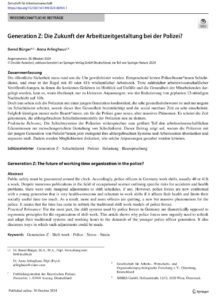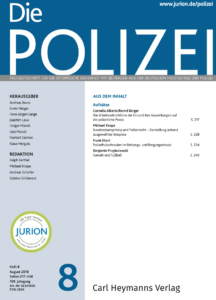The article by Dr. Anna Arlinghaus and myself has finally been published. And best of all: you can read it for free. And thanks to the kind permission of the editor of "Die POLIZEI", Prof. Dr. jur. Dieter Müller, I can also offer you an article from 2018 by administrative judge Cornelia Alberts and myself for download: "The EU Working Time Directive and its impact on police practice."
Generation Z: The future of police working hours?

Summary
Public safety must be guaranteed around the clock. Accordingly, police officers work shifts, usually 40 or 41 hours a week. Despite numerous publications on occupational science, in which the specific risks with regard to accidents and the health of employees were outlined, there were only minor adjustments, if any, such as the reduction of the planned 12-hour night shift to 10 hours.
However, police forces are now confronted with a young generation that is very health-conscious and reluctant to work shifts if it affects their health and limits their socially useful time too much. As a result, more and more officers are quitting, a new but massive phenomenon for the police. It seems that the time has come to rethink the traditional shift work models of police forces.
Practical relevance: For the most part, the shift systems of police forces contradict the findings of ergonomics on the humane organization of shift work. This article shows why, with the younger generation of police officers, police forces must now urgently rethink and adapt their traditional systems and working hours. It also discusses ways in which such adjustments could be made.
The EU Working Time Directive and its impact on police practice
Summary
The Working Time Directive 2003/88/EC1 contains specific minimum health and safety requirements for the organization of working time, in particular with regard to daily and weekly rest periods, the maximum weekly working time and the organization of night work. The implementation of this directive poses considerable problems for the police with their special tasks. Is it legally permissible, for example, to limit the rest
shorten police working hours in the event of major operations, e.g. the G20 summit in Hamburg or Castor transports? Does this also apply to regular shift work? What is actually working time and what is on-call duty? How should on-call duty be classified? After an introduction to the basic mechanisms of the EU Working Time Directive, this article examines these and other questions of great practical relevance, which have repeatedly led to heated debates between staff representatives and employers in many federal states and at federal level. In addition, the ergonomic background of the directive is explained in order to demonstrate its importance as an essential cornerstone for safe working conditions.


